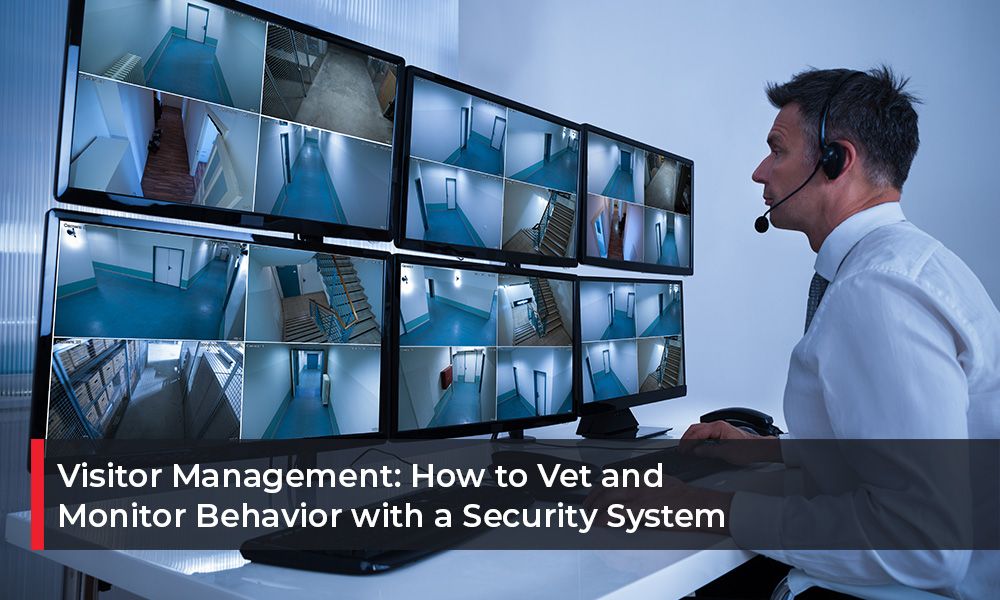Video surveillance used to be severely limited by technology. It was once confined to cramming as many screens as possible onto a wall and finding the optimum number of people to watch those screens. That made visitor management a chore, let alone keeping an eye on everything else that was happening.
But modern video security systems have come a long way. An enterprise surveillance system supports intrusion detection and access control through a combination of technologies and innovations. Fortunately, the crucial task of visitor management has become much easier. Here’s why DSI is a fan of using video security systems to vet visitors before granting them access to an area.
Four Features Which Support Visitor Management
Video surveillance technology has evolved in tandem with other security innovations, particularly when it has come to making sure security professionals know exactly who’s on the premise, where, and why. Here’s how video surveillance specifically supports visitor management and vetting.
1. Facial Recognition
Better resolution, the maturation of machine learning, and artificial intelligence means that video surveillance software is evolving to recognize ever more minute details in a scene. This is manifesting in the rise of features such as facial recognition, which can let security personnel know who’s at the door before they even ring.
2. Improved Integration
Wireless connectivity and the internet of things means greater flexibility in how surveillance interacts with access control. This ranges from object detection and people counting, to automatic access controls in the presence (or absence) of specific devices.
3. Two-Way Communications
Two-way communication allows for verbal identification as well as video surveillance. Security personnel can learn who a person is and why they’re there before letting them into the facility.
4. Night Vision
While motion detection has long existed in video surveillance, better night vision is only recently beginning to surface. Spot visitors in the dark to avoid keeping them waiting or to thwart attempts to use the cover of darkness to gain unauthorized access.
The Value of Intercom Systems
One of the most useful innovations in video surveillance is the integration of video security with two-way voice communication. In other words, it’s the use of intercoms so that security professionals can speak with individuals before letting them inside. There are a few salient but invaluable benefits to such communication:
1. Conversations provide additional identification.
Criminals are crafty. A video system alone isn’t a foolproof method of ensuring safety or identity. Take, for instance, a recent news article where a man posed as a deliveryman in order to shoot a woman with a weapon hidden in his box.
While a company hopefully won’t ever face such psychotic behavior, other occurrences such as industrial espionage are much more common. Not sure if someone is supposed to be there? Ask questions. Their answers may provide all the clues needed.
2. Security experts can observe behavior.
Someone might look like they belong there, and they might sound like it. Body language, however, provides yet another layer which can be scrutinized for clues. A quick conversation may be all that is needed to identify an individual who shouldn’t be there.
3. Visibility reinforces feelings of safety and prevents crime.
It’s been known for a long time that police visibility broadly decreases crime, and anxiety about crime, in a community. This is why, for example, police cars and uniforms have such distinct appearances.
Likewise, this is the same rationale behind why inventory control personnel greet shoppers when they walk into a store. Companies can leverage intercoms in the same way, making the security personnel visible in a friendly, non-threatening manner.
Why Vet Visitors?
Unfortunately, modern security didn’t evolve in a vacuum. Visitor management is necessary to create a workplace or facility where staff and clients feel safe. While we’d love to believe that most people are good people, it is irresponsible for security experts to ignore the unknown which strangers on-site constitute.
Likewise, visitors who wander unaware of the nature of their surroundings may also put themselves at risk. Therefore, visitor management gains an extra level of importance in places such as:
- Hospitals
- Correctional institutions
- Factories
- Research facilities
- Construction sites
That said, vetting visitors isn’t about being paranoid and distrustful of strangers. A solid visitor management strategy is an opportunity to create a professional first impression for everyone who visits a facility.
Get to Know Your Visitors from the Start
Modern video surveillance has come a long way from the early days of grainy footage which was more at home in a stylized crime thriller than a security expert’s office. DSI keeps abreast of this industry’s evolution to deliver the latest, top-of-the-industry solutions for its clients.
Ready to make the most of your video surveillance technology? Contact an expert at DSI today to start a conversation on creating a professional, secure visitor management strategy.

